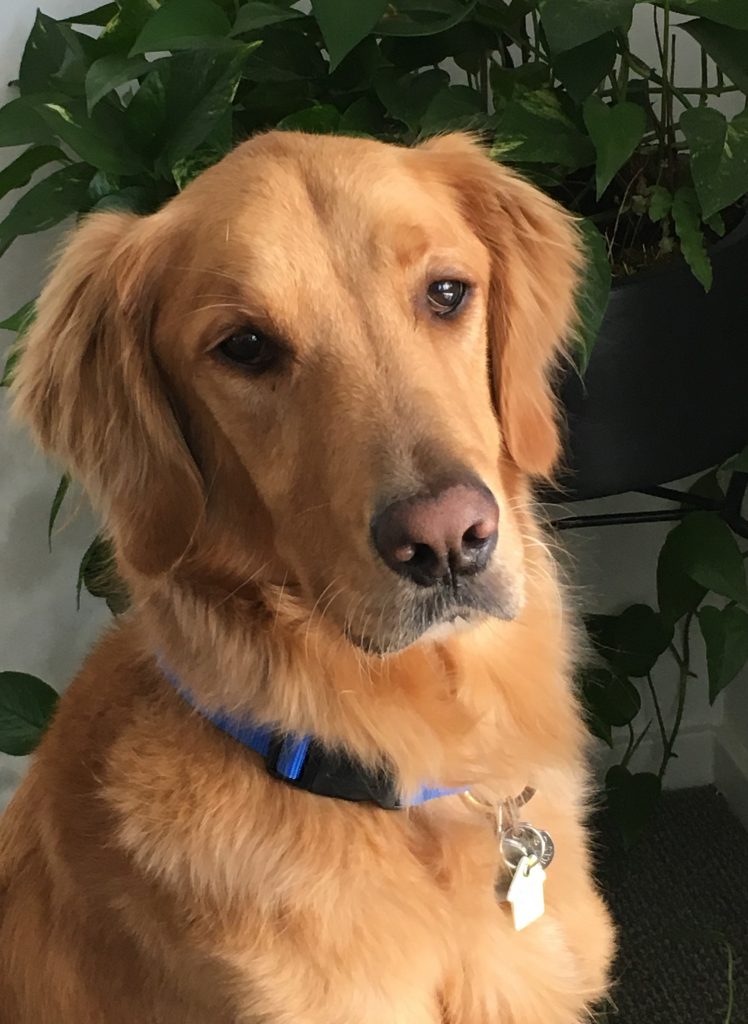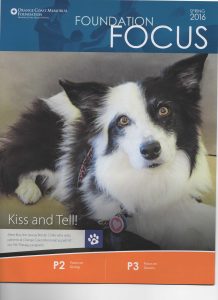 Ann Champion, a production designer in film and television, has “always had animals and the one promise I always make them is, if their lives are at stake and they can continue on with quality of life, I’m not going to arbitrarily end their lives because I don’t have money.”
Ann Champion, a production designer in film and television, has “always had animals and the one promise I always make them is, if their lives are at stake and they can continue on with quality of life, I’m not going to arbitrarily end their lives because I don’t have money.”
That promise was put to a severe test last summer. Her Greater Swiss Mountain Dog, then about 9½ years old and a picture of health, suddenly and inexplicably lost the use of her legs.
“Lillie had always been very fit,” Ann said, “so it was devastating to find her collapsed on the floor beside her bed when I went to get her to go for our walk [one August day]. She was completely alert and could raise her head and wag her tail, but even though she was trying to move all four legs she could not get them underneath her to stand up.”
Lillie weighed 110 pounds, “almost as much as I do,” Ann said. So it was almost impossible to move her. But Ann managed to get her in her car, with help from a neighbor, for a trip to an emergency hospital. The doctor did x-rays and blood tests that showed nothing wrong. He recommended taking her to a neurologist at a specialty hospital.
The neurologist recommended putting Lillie on steroids to reduce inflammation in the discs in her neck, which she thought were causing the problem. That sounded better to Ann than the other option – expensive surgery. “It would be a reasonable course of treatment and we could expect a good outcome,” the neurologist told her.
Quickly, Lillie was doing better. After a few days, the hospital wanted to send Lillie home to recover with outpatient physical therapy. “That created a whole new set of problems,” Ann said. “She was a very big girl and there was no way to get in or out of our Studio City home without having to negotiate steps. While there was a lot I was capable of doing to help her to continue to improve, I could not lift her.”
So Ann found a rehabilitation hospital. Lillie was fitted with a harness that made it easier to help her. The doctor at the rehab hospital said that he expected a full recovery. “The only negative in all this truly blessed and positive news was that it would take time – and time was money that I didn’t have.”
Ann had maxed out her Care Credit card and she applied for a higher limit. She also asked about Angel Fund and applied for help. She recalled visiting Lillie and taking her for a walk in the corridor with the help of the special harness a few days later.
“She was doing really well. I didn’t have to support her front end at all and she was placing her hind feet correctly and she was pulling me through the corridor. And I was thinking: ‘Yes! A couple more weeks of this and we’re gonna be home and walking up the hill.’ Then Lillie started doing less well, running a fever . . . and she started back sliding.”
The rehab hospital wanted Lillie to have a checkup so Ann took her to a nearby hospital, which found nothing wrong besides the disc problem. Ann decided to take her to the veterinarian in Pasadena who had treated Lillie in the past. He found liver problems, including a lesion. “So that was it,” she said, “there was nothing more that could be done. It was such a shock. Several vets had said: ‘You should have a full recovery’ or ‘You should expect a good outcome.’ Nobody said, ‘well, she may not make it.’ So I made this huge leap of faith and took on this enormous financial commitment. I‘m going to be paying for the rest of my life.”
Expenses for Lillie’s care totaled more than $9,000, including euthanasia and aquamation. She used her Care Credit to pay the balance owed to the rehab hospital – less $500 provided by Angel Fund. She also tried to raise money through an online website but after Lillie had to be put down that did not work. “I was very grateful for the help I got from Angel Fund. In this kind of situation, everything is a help. It’s a wonderful program. It was a godsend.”
Ann is struggling financially because working in the film and television industry is erratic at best.
Ann had given a home to a Swissy named Rozie before Lillie came into her life. She had lived with Rozie for six years after acquiring her at age six. So she had expected to have more time with Lillie, who had come into her life at four and a half years old.
Greater Swiss Mountain Dogs “are, without a doubt, the most wonderful dogs you can imagine in terms of their disposition,” she said. “They are beautiful and they are just absolutely incredible. But as much as I love the breed, I will never have another. They are so wonderful and you love them so much and their life span is so short. When they die, they just rip your heart out.”











